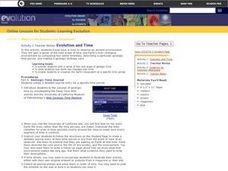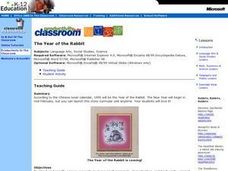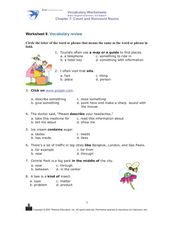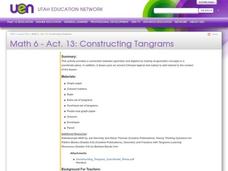Curated OER
Herbs: Healthy Alternatives or Bad Medicine??
Students compare herbal and pharmaceutical remedies for common ailments.
Curated OER
Babylonian Square Roots
Students are introduced to a method for finding square roots used by the Babylonian people of Mesopotamia. The method involves dividing and averaging, over and over, to find a more accurate solution with each repeat of the process.
Curated OER
Timeline Shuffle
Students examine the role and importance of timelines, and the method for ordering events. They order events and create a timeline of significant technology achievements and scientific discoveries in order from earliest to the most recent.
Curated OER
Ice Age Animals
Students research the ice age and the animals that were on the Earth at that time and have a debate on the explanation for the extinction of the ice age animals.
Curated OER
Exploring Literature and Weather through Chirps
Students explore and experience information about temperature changes by using crickets' chirps to calculate the temperature. The data is applied to formula and the temperatures are calculated.
Curated OER
Exploring Literature And Weather Through Chirps
Young scholars explore using crickets' chirps to calculate temperature. They read "Cricket in Times Square" and "The Quiet Cricket," read and discuss a Cricket eBook, develop a formula and calculate temperature using cricket chirps, and...
Curated OER
Happy Birthday, Earth!
Students visualize the Earth's ecosystem at a specific time period and how Earth has changed over time. They create a detailed journal entry for a specific time period and create a birthday card to Earth.
Curated OER
The Year of the Rabbit
Students explore a portion of the Chinese Zodiac with projects centered around the year of the rabbit. Students research types of rabbits, actual and fictional. Working in groups, they create a written or multimedia presentation.
Curated OER
How to "Read" an Artifact
Students discuss the types of information they can get from artifacts. In groups, they practice "reading" artifacts and determining their usage. They use inferences to test against official information about certain pieces. They also...
Curated OER
Project 1
Young scholars are given a coin to observe and make inferences about. Using a worksheet, they make two columns to list their observations and inferences in an organized manner. They develop a hypothesis based on one of the inferences...
Curated OER
Viking Ships At Sunrise
In this book response crossword, students solve 8 clues and place their answers in the crossword. There is no word bank, but all words pertain to the book,Viking Ships at Sunrise.
Curated OER
Vocabulary Worksheets Basic English Grammar 3rd Edition Chapter 16: Making Comparison
In this opposite learning exercise, students complete 12 sentences with the words that are opposites of the italic words from the word bank.
Curated OER
Using Adjectives
In this adjectives worksheet, students review when to use adjectives and read several adjective examples. Students read the noun examples and carefully select the most effective adjectives to describe them.
Curated OER
Indian Mathematical Achievements
Young scholars explore how Indian culture and religion prompted Indian advancements in math and science. In this Indian culture lesson, students read "India's Work in Math" and conduct research regarding Indian mathematicians.
Curated OER
Comparisons: Geography
In this geography comparisons activity, students read seven short descriptions of interesting places in the world. Using the ten words in the word bank, students fill in the blanks in the sentences.
Curated OER
Worksheet 8. Vocabulary Review: Opposites
In this vocabulary skills worksheet, students complete 10 sentences by selecting the words that mean the opposite of the italicized words in each of the sentences.
Curated OER
Worksheet 9: Vocabulary Review
In this vocabulary skills learning exercise, students read 10 sentences and fill in the blanks in each of the sentences with the appropriate words from the multiple choice answer selections.
Curated OER
Constructing Tangrams
Seventh graders visualize and identify geometric shapes after applying transformations on a coordinate plane. In this tangrams lesson, 7th graders construct a set of tangrams and then answer extension questions related to measurement,...
Curated OER
Finding Primes-The Sieve of Eratosthenes
For this middle school/Algebra I worksheet, students use the sieve of Eratosthenes to determine the prime number less than two hundred. The one page worksheet contains one problem. Answer is not provided.
Curated OER
Mushrooms Can Save the World
Students use mushrooms to solve problems. In this environmental instructional activity, students study how fungi have been used to combat environmental problems. Students design strategies that employ mushrooms to combat other...
Curated OER
Intermediate Sentence Completion Exercise 34
In this online interactive grammar skills learning exercise, students examine 10 sentences that are missing words and select the appropriate words to complete each of the sentences and match them to the sentences. Student answers...
Curated OER
"The Fog Horn" by Ray Bradbury
Students read Ray Bradbury's "The Fog Horn" and complete reading and vocabulary activities. In this reading and vocabulary lesson, students review the vocabulary for the story and take turns reading the story. Students discuss the story...
Curated OER
Folktales: "The Storytelling Stone"
Pupils create a folktale after finding out the importance of folktales in different cultures. In this folktales instructional activity, students determine the definition of a folktale and read a "The Storytelling Stone." ...
Curated OER
Mummy Tales
Young scholars research types of mummification. In this burial customs lesson, students work in groups to research different types of mummies and present their research to the class. Young scholars compare and contrast the types of...
Other popular searches
- Writing Ancient Egyptians
- Early Civilizations Writing
- Writing Roman Myths
- Ancient Egypt Writing
- Ancient Civilizations Writing























